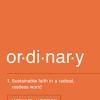 Michael Horton is the author of over thirty books and this excerpt which comes from his new book, Ordinary, releases October 7. You can now follow Michael on Twitter.
Michael Horton is the author of over thirty books and this excerpt which comes from his new book, Ordinary, releases October 7. You can now follow Michael on Twitter.
Download a free study guide at ordinarybook.com.
Think of the things that matter most to you. How do you measure your relationships? How do you “measure” your marriage, for example? When my wife and I talk about our relationship, we often have different takes on how things are going. Looking back over the course of our married years, we have seen many ways in which the Lord has bonded us together since our first year together. We can see steady growth and identify ways in which we’ve deepened in our relationship.
But when we shift our focus to the short-term, the week-to-week, it becomes harder for us to get an accurate gauge on how we are doing.
And it’s those ordinary moments filled with seemingly insignificant decisions, conversations, and touches that matter most. This is where most of life is lived. The richest things in life are made up of more than Kodak moments.
Is it any different when you are raising children? The mantra among many parents today, especially dads, is “Quality Time.” But is that true? Think about all that happens in those mundane moments that are unplanned, unprogrammed, unscheduled, and unplugged. Nearly everything! Nicknames are invented, identities and relationships are formed. On the drive home from church, your child asks a question about the sermon that puts one more piece of the puzzle into place for an enduring faith. Everyone in the car benefits from the exchange.
The problem is, when people enter adulthood, they soon discover that a memorable experience will not compensate for a shallow understanding of what they believe and why they believe it—over years of everyday exposure to and participation in the communion of Christ with his people. Nevertheless, it’s precisely the ordinary ministry, week-in and week-out, that provides sustained growth and encourages the roots to grow deep.
In many ways, it’s more fun to be part of movements than churches. We can express our own individuality, pick our favorite leaders, and be swept off our feet at conferences. We can be anonymous. Yet this movement mentality keeps us restless and makes ordinary life in and submission to an actual church seem intolerably confining.
 And terribly ordinary.
And terribly ordinary.
We need to recover not only sound doctrine, but sounder practices that serve to deepen us—and succeeding generations—in the new creation that God has called into being. We need to question not only false teaching, but false values, expectations, and habits that we have absorbed, taken for granted, and even adopted with a veneer of piety.
And who knows? Maybe if we discover the opportunities of the ordinary, a fondness for the familiar, and marvel again at the mundane, we will be radical after all.
Learn more about Ordinary or download a free study guide at ordinarybook.com.











